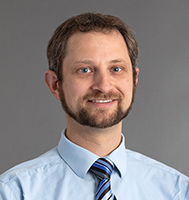Q&A with Andrew Lewandowski, DO, assistant professor, Division General Pediatrics and Adolescent Medicine
 Hometown: Madison, Wisconsin
Hometown: Madison, Wisconsin
Educational/professional background: I earned my undergraduate degree at the University of Wisconsin–Madison and then graduated with a DO from Rocky Vista University College of Osteopathic Medicine in Parker, Colorado. I returned to UW–Madison for my residency in pediatrics.
Previous position (title, institution): Pediatrician, Group Health Cooperative of South Central Wisconsin
What is your field of research or area of clinical care, and how did you get into it? My primary focus is on climate change, health communication, and policy advocacy. Initially, my focus was on environmental health education and policy advocacy as a board member for two non-profit organizations (Wisconsin Environmental Health Network and Healthy Climate Wisconsin). This then expanded into the academic realm five years ago when I started to measure the impact of climate and health communication within the clinical setting.
How would you describe your work to a 5-year-old? I help people to take care of their bodies, and I am extra good at teaching people about how nature can help or hurt our bodies.
What attracted you to UW–Madison? I was attracted to the research support from an academic institution, the collaboration opportunities with campus departments and organizations, and the people in the Division of General Pediatrics and Adolescent Medicine.
What is your favorite thing to do in Madison? Hike through the arboretum.
What’s one thing you hope trainees will learn from you and your work? I hope that trainees will learn that humans play a significant role in the health of our planet, for good or for bad. Currently, civilization is acting in ways that hurt the global environment. While most people think about these issues as affecting plants or polar bears, those harms are also transmitted to human beings through a variety of exposure pathways that cause significant morbidity and mortality. Those harms are worsening over time, and with respect to climate change, may be irreversible without urgent changes in what we do. Because those harms are happening right now, health care providers need to learn what those harms are, and to learn how humans can better adapt to our changing climate to decrease health care vulnerabilities. Health care providers need to know what their roles are in sharing that information with patients and policymakers.
Do you feel your work relates to the Wisconsin Idea? If so, please describe how. My work absolutely relates to the Wisconsin Idea! Societal advancement is like a relay race — handing off the baton from age to age, making life better for future generations. Humankind passed a major milestone 150 years ago when we started burning fossil fuels like coal, oil, and methane gas for energy. This led to amazing achievements that have made life better. We should be grateful for these accomplishments while also looking for our sign of when to pass the baton. Climate change, the product of our industrial revolution, is that sign.
What’s something interesting about your area of expertise you can share that will make us sound smarter during video chats and parties? If Wisconsin replaced burning fossil fuels with renewable energy, we would experience an annual decrease in asthma attacks by about 34,400 cases per year (children ages 6-18 years of age) and a decrease in premature deaths by about 1,910 lives per year.
What are some of your hobbies and other interests? I love baking, outdoor activities, woodworking, and playing with my 6-, 8-, and 10-year-old children.